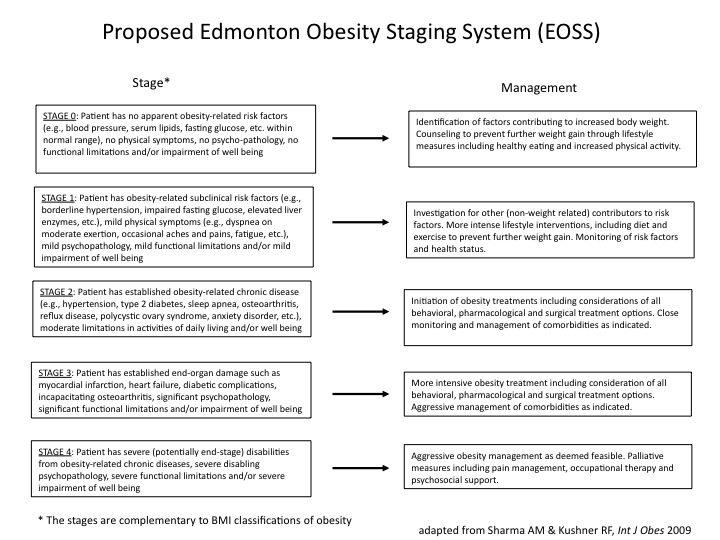This new tool for staging and treating obesity allows health practitioners to objectively assess the severity of an individual client’s obesity. It also includes specific and practical recommendations for treatment depending on clinical indicators.
Here’s the chart:
See the Edmonton Obesity Staging framework here and go here for the details about the stages, clinical parameters, and specific treatment recommendations for each stage.
Obesity experts Dr. Arya Sharma and Dr. Robert Kushner (president, The Obesity Society) developed the tool so that clinical parameters guide obesity treatment decisions rather than a blunt-force BMI assessment with its well-recognized deficiencies.
I see two promising outcomes from this innovative work:
1) Elevating obesity to the status of other life-threatening diseases
Today, studies show consistently that many docs don’t even mention overweight and obesity to patients.
Yet we’d be horrified by a physician who ignored a patient’s visible tumor and made no effort to determine its severity or to make treatment recommendations.
A tool like this elevates obesity to the status of other life-threatening diseases like cancer, which are routinely “staged” to determine severity and the most suitable treatment.
Perhaps this tool will encourage physicians to begin proactively treating obesity as well.
2) Making counseling conversations with patients and clients MUCH easier
The objective nature of the staging system takes much of the emotional baggage and perceived judgement out of the discussion of obesity.
Anything that allows constructive discussion about the health consequences of excess weight is a win for health coaches, dietitians and nutritionists, physicians, weight management programs and others.
Details on the Edmonton Obesity Staging System:
See the Edmonton Obesity Staging framework here and go here for the details about the stages, clinical parameters, and specific treatment recommendations for each stage.
What’s your reaction?
What strengths and weaknesses do you see in the staging system? And what’s your reaction to the specific treatment recommendations – like weight maintenance in Stages 0, surgery in Stages 2 and 3, and palliative measures only in Stage 4?
We keep your email secret, so don’t be afraid to post!



